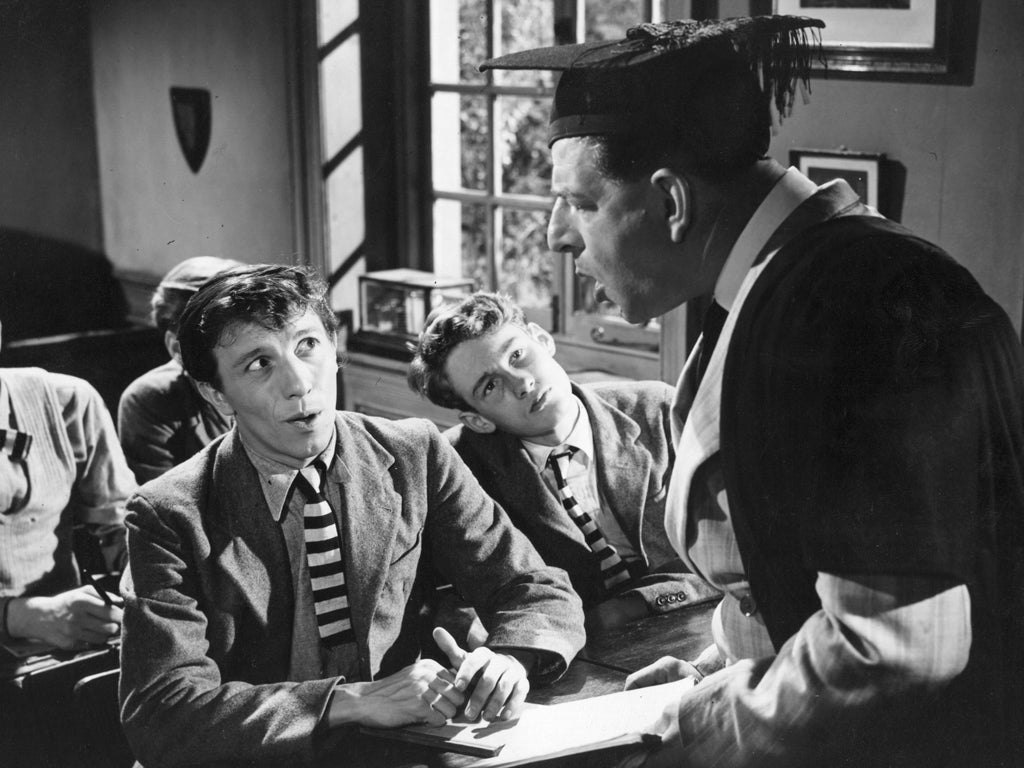Harry Fowler: Prolific screen actor known for his 'cheerful cockney' characters

The archetypal "cheerful cockney" on screen, Harry Fowler was also the quintessential character actor.
After almost a dozen film roles in his teens, he made his breakthrough in the 1947 picture Hue and Cry, as the leader of a gang of East End children taking on thieves who are using their favourite comic to communicate their crime plans.
Directed by Charles Crichton and featuring Alastair Sim in the adult cast, Hue and Cry has gone down in film history as the first of the Ealing Studios post-war comedies, although it was more of a well-made thriller for children, enhanced by location filming amid the bomb damage of post-war London.
Fowler was firmly at its centre, set on his road to a long and successful career on screen. Taking the advice of Jack Warner, another of the adult stars of Hue and Cry, he never turned down any roles offered. He was not an A-list star, but this policy guaranteed him permanent employment as a character actor.
In addition to more than 80 film roles, he was memorable on television after joining The Army Game as the Cockney wide-boy Corporal "Flogger" Hoskins (1959-60). The sitcom, set in Hut 29 of the surplus ordnance depot and transit camp at Nether Hopping, caught the imagination of the nation just a decade after the Second World War ended and with National Service still in existence.
Fowler had to carry around a kit bag in his first episode and – because the programme was broadcast live – battled on bravely after discovering that a practical joker had weighed it down with lead.
Later, in the sitcom Our Man at St Mark's, whose stories revolved around a country vicar, he was the sexton and gravedigger Harry Danvers (1964-66), known as "Harry the Yo-Yo" because he had spent most of his life in and out of prison.
"Most of my roles throughout my working life, certainly up until the Sixties, had me as the obligatory Cockney, just as you had the obligatory negro in American films," explained Fowler in Brian McFarlane's book Sixty Voices. "My idol was Jimmy Cagney, but there were no Jimmy Cagney pictures made here, so I had no aspirations regarding roles."
Born in Lambeth, south London, in 1926, Fowler left school with little education and was working as a paper boy for eight shillings a week by his early teens. After hearing his Cockney accent in a radio interview about his wartime experiences, British National Films cast the 15-year-old as an evacuee leaving London for an earl's country home in the 1942 picture Those Kids from Town, which also featured a young George Cole.
He then found himself on film sets as the stock Cockney and swiftly moved from one production to another, appearing in up to 11 a year, both main features and B-movies. Towards the end of the Second World War, he was called up for service in the RAF (1945-47) but was allowed leave to act in Hue and Cry.
Later, Fowler stood out on screen as Sam Weller, the Cockney boot cleaner at the White Hart Inn, in The Pickwick Papers (1952) and had roles of varying importance and screen time in Lucky Jim (1957), Lawrence of Arabia (directed by David Lean), The Longest Day (both 1962), Doctor in Clover (1966) and The Prince and the Pauper (1977).
His appearances were not always fleeting. For I Believe in You (1952), he spent two nights in a Borstal to prepare for the film about delinquents and probation officers, which provided him with both a leading role and Joan Collins as a love interest.
Much of Fowler's film career came before the "kitchen sink" films of the 1960s started depicting the lives, language and sexuality of the working classes, beyond the maids, taxi-drivers and comic characters traditionally portrayed in pictures written by, and featuring, the middle- and upper-classes.
So, inevitably, his prolific list of credits included those such as "amorous youth", "first novice biker", "street photographer", "airman", "barrow boy" and "Covent Garden porter". But Fowler had the chance to work with directors such as Basil Dearden, Lewis Gilbert, Ken Annakin, Val Guest, John Paddy Carstairs and the Boulting brothers, who provided a flow of British films for cinemas.
After his final appearance on the big screen, in the disappointing Chicago Joe and the Showgirl (1990), Fowler continued to be seen on television for two decades. Having taken character roles in many major series, he appeared on and off as the milkman Harry, alongside Warren Mitchell, in the Till Death Us Do Part sequel, In Sickness and in Health (1985-92). His last acting role was in the sketch show The Impressionable Jon Culshaw, in 2004.
Fowler's voice was also heard in commercials and narrating the 1975 cartoon Great: Isambard Kingdom Brunel, which won an Oscar as Best Short Film (Animated) and a Bafta award for Best Animated Film.
In 1951, Fowler married Joan Dowling, an actress who made her screen debut alongside him in Hue and Cry. After just three years of marriage, when her career was failing, she was found in a gas-filled room after taking her own life. Fowler subsequently married Catherine Palmer, who survives him. He had no children.
Henry James Fowler, actor: born London 10 December 1926; MBE, 1970; married 1951 Joan Dowling (died 1954), 1960 Catherine Palmer; died 4 January 2012.
Join our commenting forum
Join thought-provoking conversations, follow other Independent readers and see their replies
Comments
Bookmark popover
Removed from bookmarks